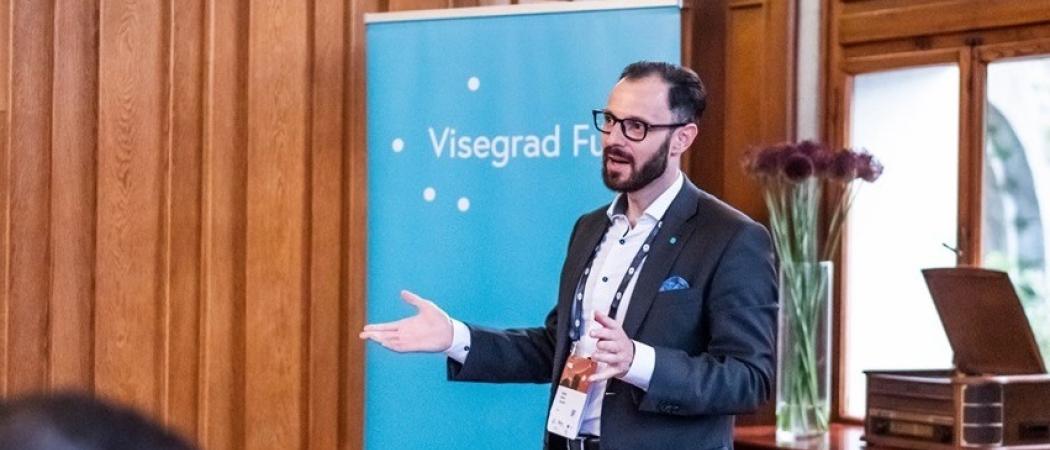A fund set up to promote cultural ties between four countries in central Europe is now investing in entrepreneurship and innovation

Andor Dávid is the executive director of the fund. Photo: Visegrad Fund
A small fund originally dedicated to cultural cooperation between the Czech Republic, Hungary, Poland and Slovakia is now increasing its effort to support cross-border entrepreneurship and innovation in central Europe.
When the Visegrad Fund was first established in 2000, the four countries focused on funding cultural exchanges and education and capacity building, which were the two major areas for spreading the idea of cooperation in the region. However, more recently the fund slowly moved into supporting innovative start-ups and setting common agendas for research and innovation.
“Research and innovation projects are becoming of more importance,” the executive director of the fund Andor Dávid told Science|Business. There is now “a mandate to start focusing more on these areas,” he said.
The fund has €8 million per year to invest, with an equal contribution coming from each country. In the past 19 years it has spent €88 million on 5,600 projects.
This summer the fund analysed the results of two pilot projects it started in 2018, a training programme run in Israel for start-up founders from the four countries, and a mentoring programme for young innovators run by Design Terminal, a start-up hub based in Budapest.
So far, the projects have funded 28 start-up founders from Visegrad countries to go to Haifa, Israel, to get entrepreneurship training and to tap into the expertise of Israel’s best business incubators and accelerators. National innovation agencies in the Visegrad countries selected seven founders each, who spent three weeks in Haifa to get “insight into how Israel is helping entrepreneurs and how a well-functioning ecosystem works,” Dávid said.
The project is based on a partnership signed by the Visegrad countries and Israel in in June 2018. Further such partnerships between the central European states and other countries with experience in supporting innovative companies are in the works, said Dávid. “We want to continue this project and extend it to other countries.”
Rare sign of coordination
Earlier this year, the Visegrad alliance was the main driver behind BIOEAST, a common strategy for the advancement of knowledge-based agriculture and forestry in the bioeconomy, also signed by seven EU member states outside the Visegrad group.
The initiative is seen as a rare sign of coordination among central and eastern European member states, amid growing concerns over an ever-widening performance gap in research and innovation. The Visegrad countries see the initiative as an opportunity to increase their standing in the upcoming EU research and innovation programme, Horizon Europe.
The fund has also set up a “start-up task force”, an alliance of four leading start-up hubs from each country in the group, in a joint effort to boost growth of the ecosystem. “Its aim is to map the legal barriers hindering the development of start-ups in region,” said Dávid.
In addition, the Visegrad fund supports a summer school in bioinformatics, molecular biology and genome editing, and has helped establish an advanced research infrastructure in X-ray spectroscopy in Prague, which scientists in the region can use. The Visegrad countries are also funding agriculture start-ups in rural areas, to boost innovation in the sector.
Political backing
According to Dávid, the fund has the political backing of all four countries in the group, which agreed to “direct special funds” to promote cross-border cooperation in research and innovation. For the Visegrad countries, the promotion of R&D is “of utmost importance,” Dávid said.
While initially formed to enhance informal links between the four countries and promote military, cultural, economic and energy cooperation, the fund now supports all sorts of projects related to research and innovation. It sponsors student mobility exchanges, but also other initiatives which boost knowledge, research and scientific capabilities in the area. Anyone can apply, provided they find participants from each country.
“What we look for are the results of these workshops or joint research activities and how they are going to be utilised for the whole region,” said Dávid.





 A unique international forum for public research organisations and companies to connect their external engagement with strategic interests around their R&D system.
A unique international forum for public research organisations and companies to connect their external engagement with strategic interests around their R&D system.